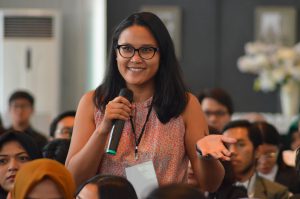Liberty Unbound: Inside Indonesia’s Freedom Movement
This article first appear on the Freedom Today Network Blog.
The common narrative has it that there is something peculiar about Asian values – supposedly shared across countries as diverse as Japan, Vietnam, India or Jordan – that makes the continent unfit for Western-style limited governments and individual liberties. People point to China’s state capitalism and Korea’s authoritarian democracy as striking evidence for the necessity of an alternative “Asian way” towards prosperity; one that heavily relies on the individual’s subordination under the collective. But while Western intellectuals are still trying to sell this idea under the guise of cultural sensitivity, young people throughout Asia are already a step ahead, making a powerful case for the universality of liberal ideals. Let me take you to Jakarta, the bustling capital of Indonesia, to see what I mean.
From seed to plant
The first thing you’ll notice upon arrival is the traffic. This goes so far that instead of talking about the weather, Jakartans would chat about traffic conditions. In a sense, you could say that both serve a similar purpose: Don’t we all enjoy complaining about something that lies beyond any person’s capacities to change? However, there’s at least one way you can bypass the endless traffic jams, and that’s by using a scooter. Motorized bikes are by far the most popular choice for the daily commute, used by over 40% of the city’s population – 40 times more than what you’d find in NYC! But I digress.
The reason I got on the plane to Java was a conference organized by a group of Indonesian libertarians. They first came together in 2015, when their paths crossed during a meeting of Liberty International (not to be confused with the travel agency of the same name) in Bali. Back then, most of them were young and inexperienced students, with almost no network or institutional support from like-minded groups. Nevertheless, three of them – Alfi, Haikal and Taka – weren’t just going to accept their fate: If these structures didn’t exist yet, they would create them. And they did.
Fast-forward to August 2017: High up on the 17th floor of a classy office tower in the middle of Jakarta’s business district, overlooking the city’s skyline, more than 200 students and high-school kids are patiently waiting for the opening speech. There’s a sense of nervous curiosity in the air; some came with friends, some on their own, but no one really knows what to expect from this. The combination of a trendy topic – future and technology – with international flair – speakers from Slovenia, Italy, Germany, the US and multiple Southeast Asian countries were featured – probably drew their attention to it. Did they have an idea what classical liberalism means? Most likely not. But this should be great news to anyone afraid of sectarian tendencies within the libertarian movement.
Young, but not naïve
 The composition of the crowd was probably the greatest achievement of the marketing campaign the local committee created. Nicole, the conference manager, was so determined to make this a roaring success that she progressively skipped sleep as the conference drew closer. The reward for her efforts? Hundreds of students were introduced to the principles of classical liberalism, uninterrupted by the caricatures our opponents sometimes like to draw of us. All of this is even more remarkable in light of the fact that no more than two years ago, they started everything from scratch.
The composition of the crowd was probably the greatest achievement of the marketing campaign the local committee created. Nicole, the conference manager, was so determined to make this a roaring success that she progressively skipped sleep as the conference drew closer. The reward for her efforts? Hundreds of students were introduced to the principles of classical liberalism, uninterrupted by the caricatures our opponents sometimes like to draw of us. All of this is even more remarkable in light of the fact that no more than two years ago, they started everything from scratch.
I doubt that you would get similar outreach if you focus on old-fashioned libertarian hobbyhorses such as the institutional structure of a free society, important as they are. By contrast, artificial intelligence, cryptocurrencies, blockchain and other futuristic technologies offer a straightforward way to connect the student’s pre-existing interests with liberal values. An additional benefit is that even a conference veteran like me can learn something new there.
Coexistence, not clash, of cultures
Still, it wasn’t the most important takeaway. What really left a mark on me was the diversity and the level of participation of the crowd. We love to talk about cultural differences, but what I mostly experienced during this weekend were cultural similarities. None of the conversations I had gave me the impression that we were talking past each other, wildly varying backgrounds notwithstanding. I highlight this because it’s become the intellectual black hole towards which immigration debates usually gravitate. Volumes have been written about the allegedly insurmountable problems that come with “parallel societies” and incompatible cultural values. But anyone who attended this conference with her eyes open would have been confronted with tons of evidence to the contrary. I differed from the participants along all kinds of dimensions, and yet we were almost always on the same page in our esteem of tolerance, peace and individual freedom.
This is a fact that cannot be stressed enough: There’s something universal about human nature that runs much deeper than what our prejudices about others would suggest. I noticed that in particular during my conversations with the Muslim girls, most of whom were wearing headscarf. It’s all too easy to slip into a mode of thinking that sees them primarily as oppressed creatures, but they weren’t anything like that. Instead, I was pleasantly surprised to meet many open-minded, well-spoken individuals who were just as worried about the rise of religious extremism in the Islamic world as Westerners are. I talked to pious Muslims who received death threads for saying that Islam shouldn’t be imposed on the citizenry through the iron fist of the state. Or, less dramatically, just people like you and me that placed their friendships above any kind of religious divide that might exist between them.
This is where self-styled defenders of Western civilization, feeding the narrative of “Islam vs. The West”, get it wrong. In their eager attempts to point out undeniable failures in the Muslim world, they swipe over the individual believer with too broad a brush, treating the Ummah as one giant collective. It’s not only severely mistaken, it’s a slap in the face of those who are on the forefront of combating religious intolerance. Incidentally, the first and most numerous victims of those dreadful attacks are Muslims themselves.
Individualism doesn’t preclude community building
To end on a lighter note, let me add a remark on the role of the community for advancing classically liberal ideas. Let’s face it: A person could be right about every single thing in the world, and yet, if she’s alone in her belief, her cause would be lost. Applied to the case at hands, a handful of disconnected libertarians, sparsely scattered over the face of the earth, could have the monopoly on truth and would still fall through the cracks.
So be creative! Drinks and night clubs might be obvious choices, but also more exotic ideas like Karaoke (I almost ruined my voice for the presentation I was supposed to give the next day by singing cheesy old Bon Jovi songs) or team-building games promise a lot of fun, and help to bond people together. And isn’t that already a wonderful thing in and by itself?
